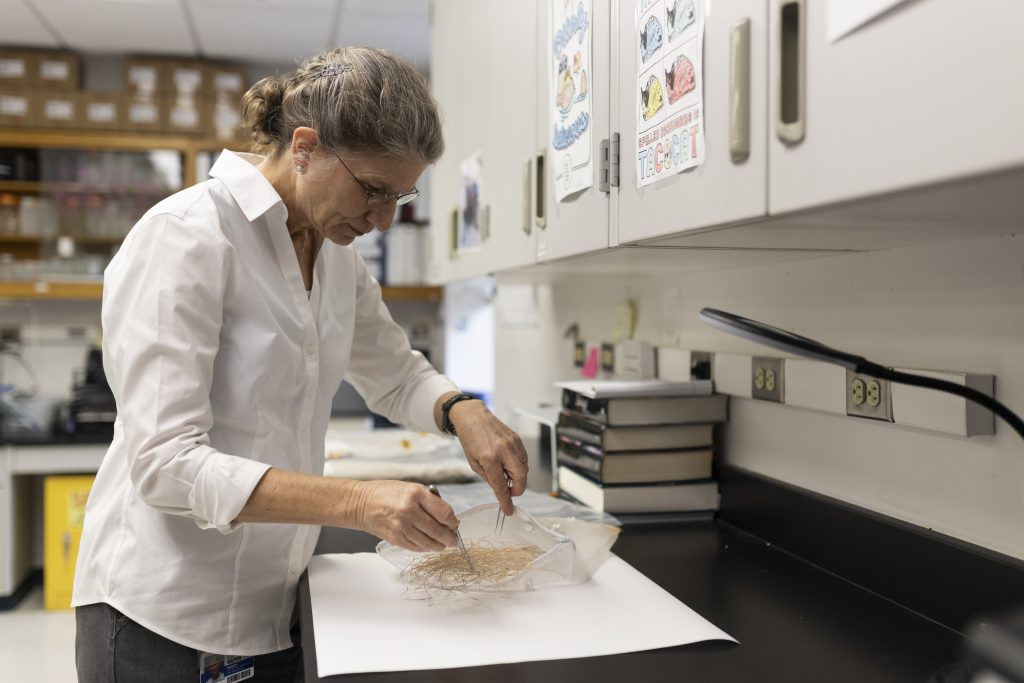Gainesville, Florida, USA
February 9, 2024
ET may have phoned home, but plants from a University of Florida Institute of Food and Agricultural Sciences (UF/IFAS) experiment were recently flown home from the International Space Station (ISS).
Plants, specifically Arabidopsis thaliana, grown from seeds by astronauts in the ISS were harvested, launched on a return capsule that touched down to Earth and shipped to eager researchers at UF/IFAS’ Space Plants Lab, including Anna-Lisa Paul and Robert Ferl.
 Dr. Anna-Lisa Paul and students working with plants and seeds grown on the International Space Station. Photo taken 01-26-24
Dr. Anna-Lisa Paul and students working with plants and seeds grown on the International Space Station. Photo taken 01-26-24
This latest experiment focuses on whether genetic strategies make plants hardier and better able to adapt to the spaceflight environment, and whether Arabidopsis plants pass along these strategies to their offspring, making them better suited to growing in space, said Paul, the principal investigator for the experiment. Paul is a UF/IFAS horticultural sciences professor and the director of the Interdisciplinary Center for Biotechnology Research. The study could help researchers understand how all plants respond to space travel.
“Consider the food we might grow, and the plants we would use to clean our air. All might be better suited if we allow them to grow a generation in space first before relying on them for food and life support,” she said. “If we learn that plants can be ‘trained’ to be in a space flight environment, we can expect plants can grow better adjusted to space as the generations go on.”
The plants were launched as seeds to the ISS in May, grown in July, harvested by astronauts in the fall, landed on Earth in December and arrived back to the researchers in January.
These plants are the second round of a multiple-part project, and the seeds sent to the ISS in May were from plants previously grown on the space station, making them second-generation space-grown plants.
The project focuses on epigenetics – the study of how the environment can cause changes in how existing genes in a living organism can be turned “on,” or “off” from stress – and how space travel affects that process. A previous study done by Paul and Ferl showed that spaceflight-associated changes in gene expression can be the result of epigenetics. This study will determine whether any of those epigenetic changes are transferred to the next generation.
 Dr. Anna-Lisa Paul and students working with plants and seeds grown on the International Space Station. Photo taken 01-26-24
Dr. Anna-Lisa Paul and students working with plants and seeds grown on the International Space Station. Photo taken 01-26-24
Scientists have studied and mapped the genetics of Arabidopsis extensively, so they can compare this spaceflight experiment to a vast wealth of experiments conducted in other, terrestrial environments. “So, it works both ways,” said Paul, “in addition to gaining insight into how plants use epigenetic tools to adjust to the spaceflight environment, we are learning how plants may use epigenetics to adjust to any adverse environment, even those here on Earth.”
“We very much appreciate the time the astronauts spent tending to our plants so carefully,” she said. “Today’s plant research on the ISS could have an impact on how we grow plants in space for decades to come.”